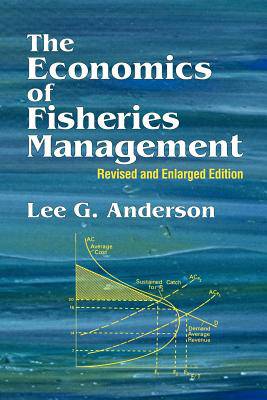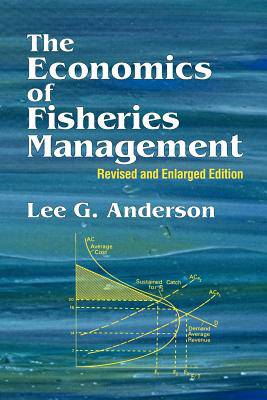
En raison d'une grêve chez bpost, votre commande pourrait être retardée. Vous avez besoin d’un livre rapidement ? Nos magasins vous accueillent à bras ouverts !
- Retrait gratuit dans votre magasin Club
- 7.000.000 titres dans notre catalogue
- Payer en toute sécurité
- Toujours un magasin près de chez vous
En raison de la grêve chez bpost, votre commande pourrait être retardée. Vous avez besoin d’un livre rapidement ? Nos magasins vous accueillent à bras ouverts !
- Retrait gratuit dans votre magasin Club
- 7.000.0000 titres dans notre catalogue
- Payer en toute sécurité
- Toujours un magasin près de chez vous
The Economics of Fisheries Management
Revised and Enlarged Edition
Lee G Anderson
Livre broché | Anglais
50,45 €
+ 100 points
Description
In 1977, Lee Anderson published the first edition of The Economics of Fisheries Management. This second edition was first published in 1986. The first edition was remarkably successful in that it remained unchallenged as the most important reference work in the realm of fisheries management, at least from an economic perspective. The second edition underwent considerable revision and enlargement. The book provides a very readable introduction to the economics of fisheries management, beginning with basic microeconomic principles, and then applying those principles to a very wide array of fisheries problems, pushing back frontiers in some advanced areas, while relying on the published literature in others. The discussion begins with an analysis of the basic open access problem and shows why, in the absence of property rights, there is a strong tendency for fish stocks to be over-exploited and for fishing fleets to be too large. After presenting the argument in terms of several different models, each allowing a slightly different look at the problem, the economic and biological effects of various types of management techniques are discussed. ".. students, researchers and practitioners will all find this second edition to be very good reading and an invaluable reference volume". Marine Resource Economics ". an excellent piece of work, that is consistent with the high standards Dr. Anderson has established in his other efforts." J. Fisheries Research Board of Canada Lee G. Anderson earned a Ph.D. in Economics from the University of Washington in 1970. He is Professor of Economics and Marine Studies at the University of Delaware and is currently the Director of the Marine Policy Program in the College of Marine Studies. He has written or edited six books and over sixty scientific papers on fisheries economics and the economics of fisheries management. He is a past member of the Executive Board of the Law of the Sea Institute past member and chairman of the Mid-Atlantic Fishery Management Council, and past Board Member and President of the International Institute of Fisheries Economics and Trade. He has acted in an advisory capacity to National Marine Fisheries Service, and other Fishery Management Councils, the Atlantic States Marine Fisheries Commission, the U.S. Department of State, the Great Lakes Fishery Commission, U.S. General Accounting Office, the National Academy of Sciences, the World Bank, the Food and Agricultural Organization of the United Nations, the European Union, the Governments of New Zealand, Australia, Oman, Morocco, and Chile with respect to fisheries management and development. In 1993 he was awarded the Rosential Award for Contribution to Ocean Science for his theoretical and applied work on individual transferable quotas. His current work deals with simulation models, design and implementation of ITQ programs, the economics of fishing in time and space, and marine reserves.
Spécifications
Parties prenantes
- Auteur(s) :
- Editeur:
Contenu
- Nombre de pages :
- 324
- Langue:
- Anglais
Caractéristiques
- EAN:
- 9781930665989
- Date de parution :
- 01-06-04
- Format:
- Livre broché
- Format numérique:
- Trade paperback (VS)
- Dimensions :
- 152 mm x 229 mm
- Poids :
- 435 g

Les avis
Nous publions uniquement les avis qui respectent les conditions requises. Consultez nos conditions pour les avis.






